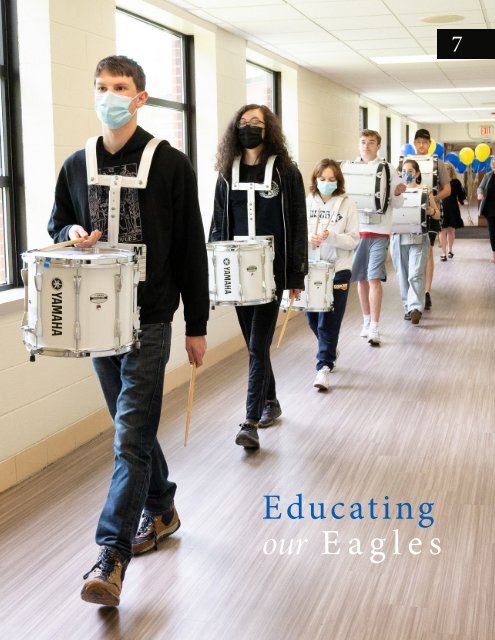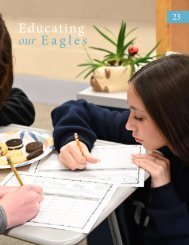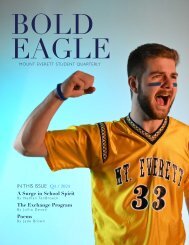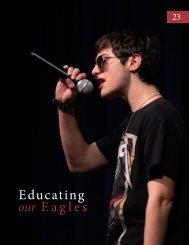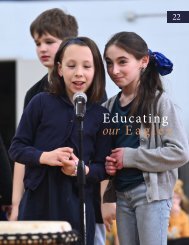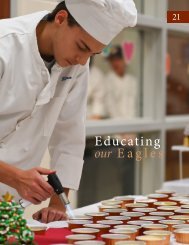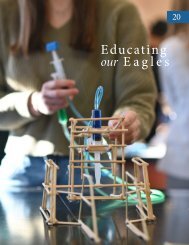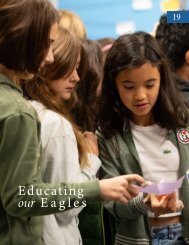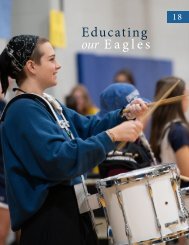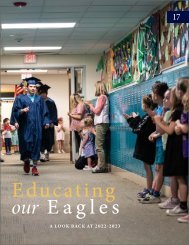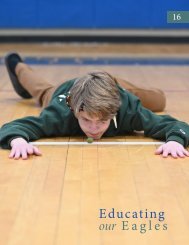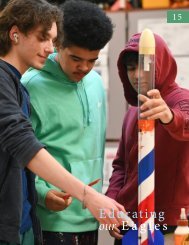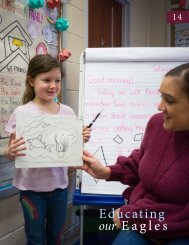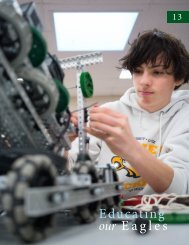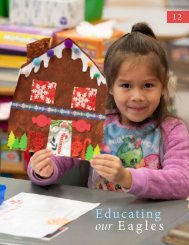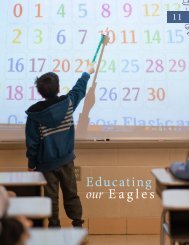Educating Our Eagles - Volume 7
The Curriculum and Instruction newsletter of the Southern Berkshire Regional School District
The Curriculum and Instruction newsletter of the Southern Berkshire Regional School District
- TAGS
- wwwsbrsdorg
- eagles
- educating
You also want an ePaper? Increase the reach of your titles
YUMPU automatically turns print PDFs into web optimized ePapers that Google loves.
<strong>Educating</strong><br />
our <strong>Eagles</strong><br />
7
CONTENTS<br />
4<br />
Introduction - Curriculum Director, Julie Dolan<br />
6<br />
Fifth Grade - Water Keepers & Caretakers – Claudine Mallory<br />
8<br />
Middle School - Socratic Seminar – Julie Barros<br />
10<br />
High School - Mutability – Christine McEvoy<br />
12<br />
High School - Biorhythms – Neal Barbieri<br />
15<br />
High School - Ping Pong – Josh King<br />
Cover: Mount Everett's Marching Band prepares to<br />
celebrate the SBRSD Teachers of the Year.<br />
Right: Mr. Wolgemuth accepts his award during his<br />
ninth grade English class.<br />
EDUCATING OUR EAGLES<br />
2
EDUCATING OUR EAGLES<br />
3
INTRODUCTION<br />
From SBRSD’s Director of Curriculum<br />
and Instruction, Julie Dolan<br />
It is hard to believe we are almost done<br />
with our first year of <strong>Educating</strong> <strong>Our</strong><br />
<strong>Eagles</strong>. This will be our last traditional<br />
issue as Kari Giordano is preparing a special<br />
final edition that will be a “Year at a Glance.”<br />
Many thanks to Kari for all the work she has<br />
put into this publication. We hope you have<br />
enjoyed seeing all the wonderful learning<br />
occurring in our District.<br />
This week we had the pleasure of recognizing<br />
some excellent educators! MCLA and<br />
the Berkshire County Superintendents’<br />
Round-table are recognizing educators<br />
from around Berkshire County on May<br />
26th at MCLA. Each district was asked<br />
to recognize teachers from a variety of<br />
categories including elementary, secondary,<br />
nurse, paraprofessional, and specialist<br />
teachers. We are pleased to be recognizing<br />
the following people.<br />
Elementary Teacher - Ellen Wallace<br />
Secondary Teacher - Kevin Wolgemuth<br />
Specialist Teacher - Josh King<br />
Paraprofessional - Didi Storti<br />
Nurse - Tricia Zucco<br />
Please help us in celebrating them and all the<br />
work they do for our students every day!
5
ELEMENTARY SCHOOL:<br />
Water Keepers & Caretakers<br />
In partnership with Mass Audubon and Housatonic Valley Association students<br />
learn about the importance of water and how water cycles around the Earth.<br />
The project begins with two in-school lessons. In the first lesson students<br />
learn about the biotic indicators that help river scientists check the quality<br />
of our local rivers and streams. Students view live specimens and complete<br />
a biotic index based on what they observe. In the second lesson students<br />
learn how to test river water for dissolved oxygen, pH, and temperature, all indicators<br />
of water quality. The final two lessons take place on field trips sponsored by Mass<br />
Audubon and HVA. Students will be visiting Pleasant Valley Wildlife Sanctuary in<br />
Lenox to use their new water quality testing skills and then they will spend the day<br />
canoeing on a short stretch of the Housatonic River here in Sheffield.<br />
As a result of instruction, students will be able to:<br />
• analyze data to determine the quality of a water source.<br />
• describe the factors that influence the quality of water.<br />
Observations:<br />
Getting our students excited about taking care of the world around them is easy! They<br />
are naturally curious and enthusiastic about any mission that will help make the world a<br />
better place for all.<br />
MA Standards:<br />
Earth Systems: Use a model to describe the cycling of water through a watershed,<br />
through evaporation, precipitation, absorption, surface runoff, and condensation.<br />
EDUCATING OUR EAGLES<br />
6
EDUCATING OUR EAGLES<br />
7
MIDDLE SCHOOL:<br />
Socratic Seminar<br />
On Friday students were introduced to the Socratic Seminar<br />
as a method of extracting conversations among classmates.<br />
There were two groups of eight students. I read an excerpt of<br />
the book while students wrote down their thoughts about the<br />
plot. After reading, they were asked to turn their thoughts into<br />
open-ended questions for the group. The rules included being<br />
respectful to others while talking, being non-judgemental of others’ responses<br />
either verbally or physically (eye-rolling), raising your hand to speak, listening<br />
with intentions to respond.<br />
As a result of instruction, students will be able to:<br />
• comprehend the book they are reading.<br />
• develop listening and speaking skills.<br />
• write open-ended questions and think critically.<br />
Observations:<br />
After all questions had been created, a leader was appointed to facilitate the conversation<br />
and call on people to ask or respond to the questions. Each student received a red cup<br />
and three yellow cubes. The class spent about 25 minutes talking and listening to each<br />
other. If and when they added to the conversation, they would add a yellow cube to their<br />
cup in order to get a good grade.<br />
Overall the feedback was terrific. Some of the comments were: “I was able to connect to<br />
the book better,” “I liked listening to other people's opinions,” and “This was a fun game.<br />
Let's do it again!” This was a great way to have students feel safe to talk and included in<br />
the discussions.<br />
MA Standards:<br />
SL 6.1a Come to a discussion prepared, having read or studied the required material.<br />
SL 6.1b Follow rules for collegial discussions, set specific goals or deadlines, and define<br />
individual roles as needed.<br />
SL 6 1c Pose and respond to specific questions with elaboration and detail by making<br />
comments that contribute to the topic, text, or issue under discussion.<br />
R. 2 Determine a theme or central idea of a text and how it is conveyed through<br />
particular details: provide a summary of the text distinct from personal opinions or<br />
judgements.<br />
EDUCATING OUR EAGLES<br />
8
EDUCATING OUR EAGLES<br />
9
HIGH SCHOOL:<br />
Mutability as used in Frankenstein<br />
Students in tenth grade English class are analyzing the poem Mutability by Percy<br />
Shelley as it relates to the novel Frankenstein by Mary Shelley.<br />
As a result of instruction, students will be able to:<br />
• determine the figurative or connotative meaning(s) of words and phrases as they<br />
are used in a text.<br />
• analyze the impact of words with multiple meanings, as well as symbols or<br />
metaphors that extend throughout a text and shape its meaning.<br />
• analyze how an author unfolds an analysis or series of ideas or events, including<br />
the order in which the points are made, how they are introduced and developed,<br />
and the presence or absence of connections between them.<br />
Observations:<br />
10th grade English read the novel Frankenstein by Mary Shelley. During a pivotal scene,<br />
the main character Viktor reflects on a poem Mutability, written by the famed poet and<br />
author’s husband, Percy Shelley.<br />
The poem’s language is uncomplicated and gives a deeper reflection into Viktor’s struggle<br />
at that point in the novel. Groups were assigned stanzas to decipher and then as a class<br />
we pieced the parts of the poem together to define the overall mood and tone of the<br />
poem. Students were then asked to link this to the themes in the novel and specifically,<br />
the plight of Viktor.<br />
Because Frankenstein is somewhat of a more complex novel, I think students appreciated<br />
being able to decode the poem and observe how a short poem could give insight into<br />
the tone of the novel. This took two class periods and allowed for a moment to reflect<br />
and consider the feelings of this character and the bigger issues he faced. Reflecting and<br />
pausing on this, helped students consider how they related to similar issues within their<br />
own lives.<br />
MA Standards:<br />
Determine the figurative or connotative meaning(s) of words and phrases as they are<br />
used in a text; analyze the impact of words with multiple meanings, as well as symbols or<br />
metaphors that extend throughout a text and shape its meaning.<br />
Analyze how an author unfolds an analysis or series of ideas or events, including the<br />
order in which the points are made, how they are introduced and developed, and the<br />
presence or absence of connections between them.<br />
EDUCATING OUR EAGLES<br />
10
EDUCATING OUR EAGLES<br />
11
HIGH SCHOOL:<br />
Biorhythms<br />
Biorhythm theory states that a person’s biological functioning<br />
is controlled by three phenomena that vary sinusoidally with<br />
time. It uses the graphs of three simple sine functions to<br />
make predictions about physical, emotional, and intellectual<br />
potential for a particular day. The theory states that when the physical<br />
cycle is near a high point, the person can do well in physical activities,<br />
and so forth. Students then graphed their own biorhythms for the<br />
month of May to see which days would be better than others, according<br />
to the theory.<br />
As a result of instruction, students will be able to:<br />
• model periodic phenomena with trigonometric functions.<br />
Observations:<br />
The students were able to see that there is a place for sine waves. Many<br />
other examples of the natural occurrences of sine waves were given, but<br />
the students seemed the most interested in this “application” as a fun<br />
examination of trigonometric functions.<br />
MA Standards:<br />
Model periodic phenomena with trigonometric functions.<br />
Choose trigonometric functions to model periodic phenomena with<br />
specified amplitude, frequency, and mid-line<br />
Given algebraic, numeric and/or graphical representations of<br />
functions, recognize the function as polynomial, rational, logarithmic,<br />
exponential, or trigonometric.<br />
EDUCATING OUR EAGLES<br />
12
EDUCATING OUR EAGLES<br />
13
HIGH SCHOOL:<br />
Ping Pong<br />
Last year the Wellness program purchased four Ping Pong tables to use<br />
with students. This week has been a collaboration with Railroad Street<br />
Youth Project addressing mental health and awareness. Many of classes<br />
have been taking MCAS, AP Exams, or finishing up their senior year<br />
so we take this opportunity to let them decompress and play a relaxed game of<br />
Ping Pong<br />
As a result of instruction, students will be able to:<br />
Physical Health Strand<br />
• recognize decisions that all individuals will make with respect to their bodies<br />
in daily living and identify the relationships among actions, conduct and<br />
wellness.<br />
Social and Emotional Health Strand<br />
• develop skills needed in daily life as they come to learn about their identity<br />
and how to manage interactions with other people<br />
Observations:<br />
Everything worked well! The kids enjoyed that down time and relaxed atmosphere<br />
while also competing against one another. The great thing is we are able to open<br />
this activity to all grades 6th - 12th so the opportunities are unlimited for our<br />
students.<br />
MA Standards:<br />
2.9 Demonstrate developmentally appropriate basic manipulative and advanced<br />
specialized<br />
physical skills, including throwing and catching different objects with both<br />
accuracy and force, hand and foot dribbling while preventing an opponent from<br />
challenging, and accurate striking proficiency<br />
2.17 Demonstrate developmentally appropriate competence (basic skills,<br />
strategies, and rules) in many and proficiency in a few movement forms and motor<br />
skills (team sports, aquatics, individual/dual sports, outdoor pursuits, self-defense,<br />
dance, and gymnastics)<br />
5.11 Analyze healthy ways to express emotions and to cope with feelings, including<br />
the common causes of stress, its effects on the body, and managing stress<br />
EDUCATING OUR EAGLES<br />
14
EDUCATING OUR EAGLES<br />
15
EDUCATING OUR EAGLES<br />
16


